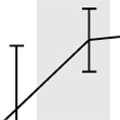Abstract
Very little is known about molecular evolution in the human malaria parasite Plasmodium falciparum. Given the potentially important role that introns play in directing transcription and the posttranscriptional control of gene expression, we compare rates of intron/gain loss and intronic substitution in P. falciparum and the rodent malaria P. y. yoelii in both orthologous and duplicate genes. Specifically, we test the hypothesis that intron gain/loss and protein evolution is accelerated in duplicate genes versus orthologous genes in both parasites using the genome sequence of both species. We find that duplicate genes in both P. falciparum and P. y. yoelii exhibit a dramatic acceleration of both intron gain/loss and protein evolution in comparison with orthologs, suggesting increased directional and/or relaxed selection in duplicate genes. Further, we find that rates of intron gain/loss and protein evolution are weakly coupled in orthologs but not paralogs, supporting the hypothesis that selection acts on genes as functionally integrated units after speciation but not necessarily after gene duplication. In contrast, we find that rates of nucleotide substitution do not differ significantly between intronic sites and synonymous sites among duplicate genes, implying that a large fraction of intronic sites in Plasmodium evolve under little or no selective constraint.
